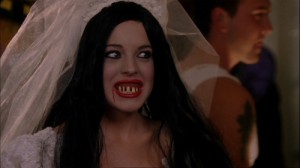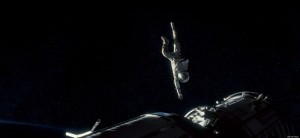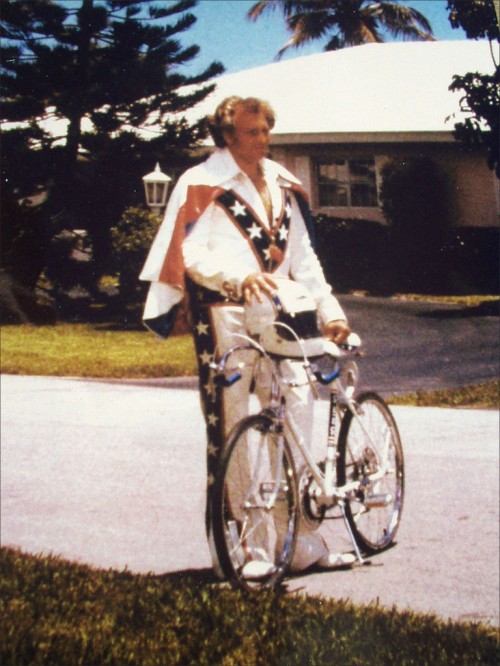ALL THIS WEEK: Sympathy for the Cubicle Rat at Nextbook.org, starring Franz Kafka and Joshua Cohen

not Joshua Cohen. Or Kafka.
Check back at Nextbook.org every day this week for a new installment of Joshua Cohen’s writing about Kafka’s Office Writings. Also, there may be periodic updates here, highlighting our favorite pieces from the series and/or reminding you to go read it.

Who could say no to this mug?
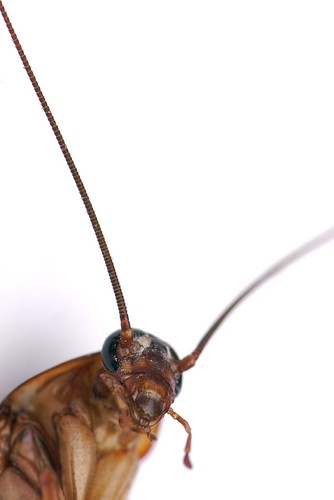
Or this bug?
A LOT OF READS, *IF* YOU WANT THEM
Happy Halloween, if you care!
I am going to a party for a magazine tonight. I am very excited, I think. When I described what my expectations for the party are to a friend, I simply said: “It will be very Internet.” So, I am not too sure what magazine parties are like. Do websites throw them? (When is the annual HTMLG party, Blake?)
You know who else is really into the internets right now? The Pynchon. Proof: Bleeding Edge. (Yawn, last month’s news, you know and I am sorry!!) But here, two good things on last month’s news:
Christian Lorentzen’s “In the Cybersweatshop”-Featuring delicious intro, and the incredible revelation my favorite gross/amazing dive-bar is joked about in the book (the in/famous Welcome to the Johnsons of $2 PBRs).
Joshua Cohen’s “First Family, Second Life”-the Lorentzen piece addresses the prominent role of paranoia to extreme effects in the novel. In a similar tone, Cohen recognizes the pivotal role of chance as a narrative mechanism in the book: it seems like the paranoia almost yields meaning, when chance is investigated.
Apparently, the internet is our generation’s opium, too. And it is making us dumb. Which reminds me, avoid the film Gravity, it is awful. (1/2 self-promotional, sorry!!)
You know what is NOT awful, besides “The X-files?” The soap-operaish tv-show Scandal. I think I even figured out why I like it: the key romance is “like emotional abuse.” Though my personal favorite is the comedic genius of Cyrus, which is SOO internet. It just feels amazing to watch Kerry Washington be big culturally after being a sidekick to Julia Stiles in a 90s dance movie about the struggles of whiteness. (Julia Stiles is that girl from the vodka ads, btw.)
The beauty of today, some claim, is that we are consuming a lot of trash critically or knowingly. I certainly agree, to an extent, but I certainly do not fiscally support books that are catering to that very gross internety quality. (“It shouldn’t be about the book but the money you can make from the book,” said Ruby-Strauss’s boss, Jennifer Bergstrom.)
Recently, I was talking to my friend who is going to the magazine party with me about non-internet greatness. So let us now praise famous men who are worth it, and talk about the possibility of getting a tattoo in honor of James Agee, which we actually did-sorry mom! Or let’s just embrace the art of fucking up, and think about how to do it beautifully.
Read this epistolographic piece if you might approve of my Agee tattoo. It is very good.
The interesting thing about the internet is the notion of “information” we have broadly reached. Is our understanding of “history” too skewed and subjective? Whether it (the “information”/”history”) matters (or not) and why it matters (paranoia? chance?) seems to be the key theme of all these reads, but they are only here *if* you want them.
The way people handle information defines them. Look at Paul de Man, reconsider him. Things are culturally slippery, sure, but will you buy Jenna Jameson’s new book, which she didn’t even write?

October 26th, 2013 / 8:36 pm
Maverick Jetpants in the City of Quality by Bill Peters
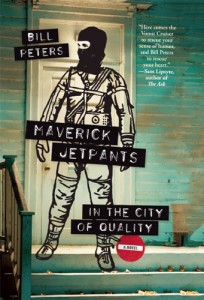 Maverick Jetpants in the City of Quality
Maverick Jetpants in the City of Quality
by Bill Peters
Black Balloon Publishing, October 2012
280 pages / $14 Buy from Amazon or Indiebound
Rebecca Solnit identified two disparate meanings of the word “lost” in her book A Field Guide to Getting Lost: “Losing things is about the familiar falling away, getting lost is about the unfamiliar appearing.” Bill Peters’ first novel, Maverick Jetpants in the City of Quality, does a tremendous job of exploring these two meanings with characters who think and speak with an idiomatic style made up of in-jokes (“Colonel Hellstache,” “Pinning Bow Ties on the Dead,” “Jaeger Cowpunch”) shared between characters that, over the course of the book, competes with the generic language of the Real World.
Peters’ characters ably resist the realities of adult life (until they can’t) and its pre-existing modes of expression, which one character claims have been “made stale or co-opted into oblivion by government agencies,” forcing man to be “incarcerated by his own linguistic detritus.” This helps to explain why, at an earlier point in the novel, that same character makes the following pronouncement: “Your dad was a gelding and your mother was a whale, and they gave birth to a suitcase with a flesh mask inside.”
The arc of Maverick Jetpants’ story will be familiar to readers of contemporary coming-of-age novels: Nate, the book’s narrator, chronicles the unraveling of his best friendship with Necro, an artist caught up in a “business opportunity venture” for “capital – you know – expenditure or whatever” with a dangerous group of neo-Nazis; the differences between his oddball stepdad (Fake Dad No. 3) and biological father (Real Dad); the banal thrill of cruising through a place (Rochester, New York, 1999) you simultaneously curse and celebrate; and the demands and dialect of adulthood.
Peters’ singular style is so good, though, his character’s sentence-shapes and sounds so far from bored or boring, that plot summary seems somewhat beside the point. Nate suffers from what you could call VDD (Vocational Deficit Disorder), and Peters’ voice sometimes resembles what Joshua Cohen recently referred to as E.S.L.: “Ennui as a Second Language, or Emulating Sam Lipsyte, a style that entertains through mortification, and mortifies through . . . you get it.” Even directionally challenged characters with bit parts have voices that want to sing on the page. A character introduced near the end of the book has the following first words: “So let’s go get that drink already […] Pitcher of Get-the-Hell-Outta-Here-Juice.”
As the novel progresses the constituent parts of Nate’s narration mutate from fast-and-furious slang to more serious units of straight-talk. Compare, for example, the following two passages. The first is from a scene early in the book, immediately after an explosion that has injured Nate and Necro’s friend Wicked College John; the second from a scene late in the book, involving their friend Toby:
“Because, I come out here and try to talk to Necro about a Plan. And, now? Necro knee-slides on the pavement to perform CPR on Wicked College John? Like he’s trying to be Tadahito Murakami: Ninja Surgeon and save the world?”
—
“Since I’m calling this evening over, I twirl my keys around my index finger. But suddenly I feel a scrape on my knuckle and my keys are gone, because Toby just yanked my key ring off my finger, hooked the girl’s body with one arm, and opened the driver’s side rear door and slammed it shut. He slaps down all the locks on the windowsills and immediately grabs the girl by her hair and facebombs her on the lips. I hear her gag and try to say something, and Toby’s suctioning her whole face practically, and something creaks in the car, and a handprint smears on the window, and I see Toby’s fist under the back of her shirt, and the girl’s hair mats up against the glass, and Toby almost rolls into the seat well, and the car shakes when he palms the floor….”
September 30th, 2013 / 11:00 am
in which Lily teaches a class on a whiteboard
This is what happened in my grad Form & Technique in Fiction class today:
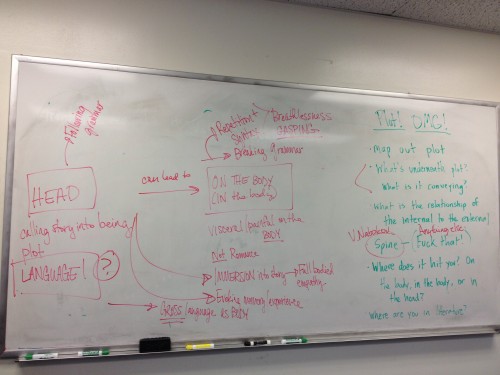 Here is how it happened. Every Wednesday, students read articles and essays that are NOT fiction. Last class, they read & we discussed a unit I called “The Human Body,” which included the following texts: Dong et al, “Unilateral Deep Brain Stimulation of the Right Globus Pallidus Internus in Patients with Tourette’s Syndrome”
(from The Journal of International Medicine); Grahek, Feeling Pain and Being in Pain, “Ch. 1: The Biological Function & Importance of Pain”; Ramachandran, Tell-Tale Brain, “Ch. 3: Loud Colors and Hot Babes: Synesthesia”; and
Scarry, The Body in Pain, “Ch.3: Pain and Imagining.”
Here is how it happened. Every Wednesday, students read articles and essays that are NOT fiction. Last class, they read & we discussed a unit I called “The Human Body,” which included the following texts: Dong et al, “Unilateral Deep Brain Stimulation of the Right Globus Pallidus Internus in Patients with Tourette’s Syndrome”
(from The Journal of International Medicine); Grahek, Feeling Pain and Being in Pain, “Ch. 1: The Biological Function & Importance of Pain”; Ramachandran, Tell-Tale Brain, “Ch. 3: Loud Colors and Hot Babes: Synesthesia”; and
Scarry, The Body in Pain, “Ch.3: Pain and Imagining.”
11 foducts 4 the lamily
1. Hobart 2.0, wow, with new web features, etc.
2. Diagram 12.4 is OUT!
3. Joshua Cohen:
The repetitions are, in my mind, linked to the idea that the Internet is conceptually vast, but you end up spending the bulk of your time visiting the same sites again and again (or perhaps this is just my own practice). I’m not especially interested in the variety of the Internet; rather I’m interested in the human experience of the promise of variety, a promise fulfilled only by a similarity or sameness, and the idea that the computer seems to license every option of virtuality, while our own humanity seems limited, or to self-limit, through laziness or shame, to the same thing every day.
7. Disorientation, a reading list, at The Millions:
11. My writing tip of the day: It isn’t done when you think it is done.
5. My Grading Scale for the Fall Semester, Composed Entirely of Samuel Beckett Quotes. (By Matt Bell)
Literature as Commentary on Grammer
I like to think there is no substitute for space but I kind of don’t know how true anything is. If you don’t have space, you don’t have a place to unpack your shit. I can’t remember what I’ve read unless I look up and see the spine on its shelf.
This sentence: a painting of Alfred Korzybski reading Hamlet in the shower, as he drops the soap. We either do or do not look away. I’m taking care of my neighbor’s chickens. They are famous. Mostly in the gay community. A couple want their butts shaken. After this is done now and then they strut away, content. And you can’t really help but gawk at these dinosaurs as they till millions of years into the soil with an awkward scratch, arching their skinny necks, ruffling dirty feathers. If the soil is watered, or tilled, they gaze into the brown as if it were the very very meaning of life.
Theory of Prose & better writing (ctd): The New Sincerity, Tao Lin, & “differential perceptions”
In the first post in this series, I outlined Viktor Shklovsky’s fundamental concepts of device (priem) and defamiliarization (ostranenie) as presented in the first chapter of Theory of Prose, “Art as Device.” This time around, I’d like to look at the start of Chapter 2 and try applying it to contemporary writing (specifically to the New Sincerity). As before, I’m proposing that one can actually use the principles of Russian Formalism to become a better writer and a better critic.
Only Five Days Left to Enter THE CUPBOARD Contest!!!
The Cupboard is a quarterly prose chapbook series that has published volumes by Jesse Ball, Mathias Svalina, Caia Hagel, Andrew Borgstrom, and Joshua Cohen—among other great writers.
The Cupboard is also very excited to announce that Maud Casey will judge the contest. (See bio.)
The contest entry period will be open February 1 and will close April 30. Entry fee: $10. Word limit: 4,000 to 10,000 words. All entries will be considered for general publication as a volume of The Cupboard.
Click here to enter or find more information. Please feel free to email cupboard [at] thecupboardpamphlet [dot] org with any questions.
April 25th, 2012 / 11:31 am
Blurbs I’d Like to See
 “This book threw me to the floor, naked and racist, desperately gasping for air. A work that could truly only have come from [author’s name]’s extended pregnancy.” – Harper’s
“This book threw me to the floor, naked and racist, desperately gasping for air. A work that could truly only have come from [author’s name]’s extended pregnancy.” – Harper’s
“Bubbling with humility.” – The Independent
“<;-)” – Cynthia Ozick
“The Justin Taylor of the fixed gear scooter generation. Joshua Cohen for your gay Jewish nephew. Just because you don’t get it, doesn’t mean you shouldn’t try. The codes of these satin pages will bleed you dry with their suggestive, yet ultimately fustian, message. Not to be missed by any fans of Bearbaiting: 2100.” – Paul Auster’s great-great-granddaughter
“If films are the new books, this book is an old film. [Author’s name] tucks you silently into bed and turns out the light on charity.” – New York Times
“[A blurb by a hotdog].” – a hotdog at Gray’s Papaya (6th Ave/8th St. location)
“My girlfriend loved your TV show when you used to have one.” – The Guardian
“Like fingernails across the chalkboard of a Brooklyn coffee-shop. Like music played on a broken giraffe’s carcass. [Author’s name] has given us a gift more permanent than HIV/AIDS, more lasting than the Lincoln assassination, and your kids will be talking about it long after you’ve become the bigot.” – Muareen Corrigan (for NPR)
“An invalid wakes at dawn with a banana-clip necklace. This novel won’t tell you the answer to any age old question, but it may find you choking on a half eaten bagel on the city bus.” – Frank Peretti
“If Nabokov, Updike, Lish, and Baker suffered from psoriasis, [author’s name] can be said to have eczema.” – The Millions
“I was left with a tacit boner.” – Erik Stinson

